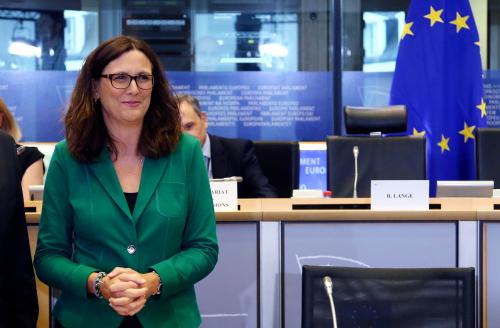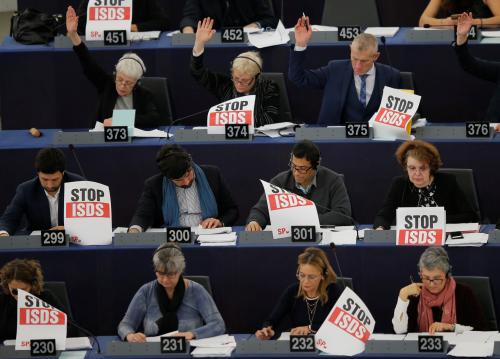Since Germany and Pakistan negotiated the first modern bilateral investment treaty in 1959, more than 3,000 trade and investment agreements have been concluded among 180 countries to protect foreign investment. Many of these agreements contain a mechanism called “investor-state dispute settlement” (ISDS), which enables a foreign investor to invoke arbitration against a host government for the breach of certain investor protections.
More than two years ago, the United States and the European Union launched negotiations to forge a new Transatlantic Trade and Investment Partnership (TTIP) to deepen their already extensive economic ties. The talks have advanced more slowly than many had hoped, and ISDS has become one of the subjects of heightened controversy. At the G-7 meeting in June 2015, U.S. and EU leaders instructed their teams to accelerate work on all outstanding issues with the goal of finalizing the outline of an agreement as soon as possible—and preferably by the end of this year. Both sides are now preparing for the next round of negotiations beginning October 19 under increased pressure to make concrete progress. The conclusion earlier this month of the Trans-Pacific Partnership (TPP) the United States has been negotiating with Japan and 10 other Asia-Pacific partners provides further motivation to complete TTIP.
Government officials, legislators, and progressive and conservative groups on both sides of the Atlantic have raised concerns about ISDS. Some question the logic of a state protecting foreign investors, but not its own domestic investors, by enabling a foreigner to file a claim against a state before an independent arbitration tribunal. Others acknowledge the value of ISDS but contend that it should be excluded from agreements between developed economies, such as TTIP. Still others call for reforms to improve the ISDS process and reduce the potential for abuse.
Last year the European Commission froze negotiations on TTIP’s investment chapter pending completion of public consultations. In May of this year, the Commission published a draft concept paper outlining a proposed path forward, including affirmation of the right of governments to regulate in the public interest, and the creation of both a bilateral and an international appellate mechanism. Last month, the Commission published a detailed proposal embodying these and other ideas, for which it is seeking member state support before presenting to the United States.
This paper explores the rationale behind the development of ISDS and its relevancy today. Reviewing the debate and modifications that have already been made, it corrects the record on a number of contentious points. It concludes that the reasons for maintaining the mechanism in future agreements are more persuasive than those supporting elimination. At the same time, TTIP negotiators must consider improvements that would instill greater confidence in the legitimacy and integrity of the process.
A number of relatively non-controversial reforms have already been proposed that build upon enhancements made by the United States in 2004 in its Model Bilateral Investment Treaty (Model BIT) and by the EU in its recent trade and investment negotiations with Canada and Singapore. Additional improvements are expected to be part of the TPP investment chapter, which is being prepared for publication. However, other potential improvements, including those suggested in the EU’s latest proposal, merit further analysis of their potential risks and benefits.
Two steps can accelerate this process. First, U.S. and EU negotiating teams should reach agreement on a number of key principles to guide their work in the weeks ahead. This step should not be too difficult. Such principles should include the following elements:
- There should be a neutral forum for adjudication, independent of the potential for bias inherent in a host state’s legal system.
- An arbitration tribunal should operate under established principles of international law with consistency and predictability.
- The arbitrators should be beyond reproach in terms of independence, impartiality, and integrity.
- The tribunal should have the authority to dismiss frivolous and other non-meritorious claims early in the process.
- The proceedings should be transparent and open to the public.
- An option for annulment, and possibly appeal, should be considered.
Second, in light of the complexity of the issues under discussion and the importance of avoiding unintended consequences, the United States and the EU should appoint a senior group of experts to review in detail several of the more provocative proposals that have been put forward by the EU—such as creating an appellate mechanism for TTIP or, more broadly, an international ISDS court. This should be a broad group of experts representing a range of academic, legal, business, public interest, and other expertise, and reflecting deep knowledge of international investment law, arbitration rules, and judicial and regulatory decision-making. To build greater public support, the group should include voices that support modifications as well as oppose them, in an effort to analyze the strengths and weaknesses of the various options, and to identify consensus where possible.








